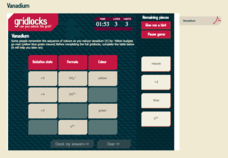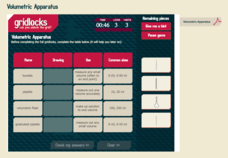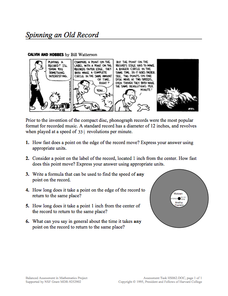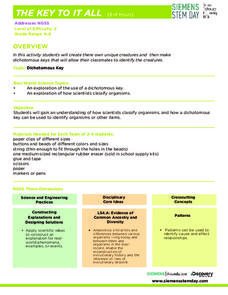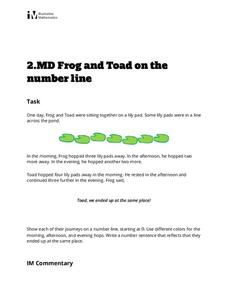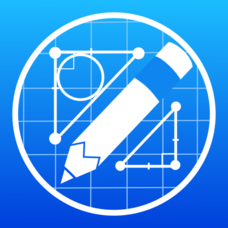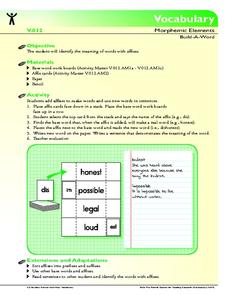Royal Society of Chemistry
Elements 2
Did you hear about the chemist reading the book about helium? He couldn't put it down. Scholars match 12 chemical elements, including helium, to their symbols. Then they complete three Sudoku-style puzzles using these names and symbols...
Royal Society of Chemistry
Esters from Alcohols and Acids
Fats and oils often contain esters, which sometimes find their way into perfumes due to their pleasant smells. Scholars match the name of esters made from four different types of alcohol and four different types of carboxylic acids....
Royal Society of Chemistry
Shapes of Molecules—Distortion from the Pure Geometry
Ready to introduce the realities of molecular geometry to chemistry pupils? Use a logic-based interactive! Perfect as individual practice, the puzzles explore the bond angles and repulsions present in three common molecular shapes.
Royal Society of Chemistry
Vanadium
Introduce your chemistry scholars to the periodic table's Goddess of Beauty! Through an interactive that highlights the transition metal vanadium, learners discover the colors produced in solution as vanadium changes oxidation state....
Royal Society of Chemistry
Volumetric Apparatus
Can your class tell the difference between a burette and a pipette? Develop their lab apparatus knowledge using a series of puzzles. The online activity associates the name, image, and sizes of burettes, pipettes, volumetric flasks, and...
Chemistry Collective
Virtual Lab: ATP Reaction (Thermochemistry and Bonding)
If you've ever felt a little drained ... try converting some ATP to ADP! Science scholars perform one of life's most important reactions using a simulated lab workbench. The fun-to-use interactive allows pupils to control the reactants...
Chemistry Collective
Virtual Lab: Determining the Solubility Product
No chemistry lab? No problem! Scholars use a virtual lab to determine the solubility product of four different chemicals. They then use the results of their experiments to see if higher solubility product values equal greater solubility.
IB Psychology
Key Terms Traffic Lights
How much does your class know about psychology? What about empirical evidence? If they could use some time to learn the essentials of psychology, use a quick reference sheet to note what they know before the test, after the unit, and at...
University of North Carolina
Annotated Bibliographies
When researchers write a paper, they become curators of information. It's their job to determine the best sources of information on a topic and use those sources to inform their writing. As part of a larger series, a handout on annotated...
Concord Consortium
Spinning an Old Record
Take a trip back in time to examine angular velocity. Using the revolutions per minute, learners calculate the speed of a point on a 33 record. They compare the speed of a point on the edge of the record to the speed of a point closer to...
Microsoft
Variables
You won't want to replace the resource with anything else. Future computer scientists use Minecraft to learn about variables in computer coding. They engage in several activities to master the variable code block, then apply it in an...
Discovery Education
The Key to It All
Which characteristics make organisms unique? Dichotomous keys simplify the process of classifying organisms by focusing on these unique characteristics. Young scholars learn how to use the dichotomous key flow chart by creating their own...
EngageNY
Performance Task: Planning the Final Brochure
Partners use a Brochure Planning Guide to create brochures giving advice to consumers about products based on the research they finished about working conditions. After planning the brochure, they complete a sketch outline and then...
American Museum of Natural History
They Glow!
Would you believe marine animals can make their own light? An online resource describes the process of bioluminescence and how animals in the ocean use it to survive. The lesson features a catchy tune that describes the behavior of ocean...
Missouri Department of Elementary
How We Are Alike And Different
Scholars develop social awareness by exploring the concept of similarities and differences. Learners examine two beverages and use a Venn diagram to identify similarities and differences. They tally each item to identify if they are more...
PBS
Code Creators
The lesson is real—even if the computer code isn't. Scholars learn about pseudocode, which simulates computer code using everyday language. They write pseudocode for simple actions, then have classmates guess the action from the written...
Smithsonian Institution
Weather Widget
What's so difficult about predicting the weather? Scholars work collaboratively to build a device that models how meteorologists use computers to forecast weather. Team members collect and interpret data while working together to...
Amani Project
Harmony Break! Mood Meter Floor Board
The big idea in the fourth lesson from the Amani Project is that people can experience different emotions in precisely the same event. One participant uses their body to express an emotion. Then other participants move to the area of the...
Illustrative Mathematics
Frog and Toad on the Number Line
Administer a learning activity that challenges your class to use a number line in the form of lily pads. Learners are instructed to display the number of hops that Toad and Frog take during their journey on a number line. Young...
Bytes Arithmetic
Geometry Pad+
Graphing paper, pencil, ruler, protractor, and compass, all get replaced or supplemented with this dynamic geometry application. Here, you can create, move, and scale many different shapes, as well as, explore and change their properties...
National Nanotechnology Infrastructure Network
Is Measuring an Art or a Science?
Not only do future engineers learn the difference between accuracy and precision, they also get some hands-on experience using different measuring tools.
Ginger Labs
Notability
You'll want to take note of this app! Create custom notes that you can use to present and record information. Use the formatting options to make your notes look great, and the sharing options to keep your class up to date!
Florida Center for Reading Research
Vocabulary: Morphemic Elements, Build-A-Word
An affix plus a base word equals what? A new word! Invite your class members to discover words using affixes and base words. Learners then write sentences using the real words that they put together.
Have Fun Teaching
March Journal Prompts
Engage your class in writing right away during the month of March. This resource provides writing prompts for every day in March, and each is decorated with a shamrock. For most of the prompts, learners use creative writing skills,...
Other popular searches
- Addition Using Manipulatives
- Creating Art Using Music
- Chemical Change Using Apples
- Lessons Using Apples
- Multiplying Using Arrays
- Math Using Arctic Animals
- Addition Using Grouping
- Addition Using Unifix Cubes
- Adding Decimals Using Money
- Cultural Studies Using Math
- Add Fractions Using Pictures
- Addition Using Manipulative's



